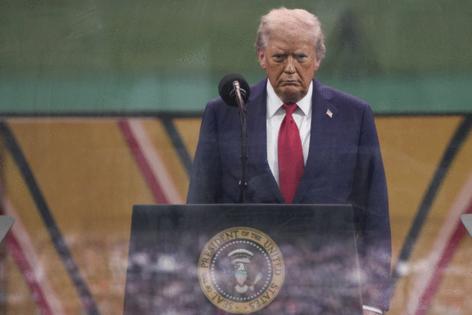Trump hints he'll hold off Iran strike, give diplomacy time
Published in News & Features
U.S. President Donald Trump signaled he would give diplomacy a chance before deciding whether to strike Iran, dialing back on recent comments that suggested military action could be imminent.
“Based on the fact that there’s a substantial chance of negotiations that may or may not take place with Iran in the near future, I will make my decision whether or not to go within the next two weeks,” Trump said in a dictated message, according to White House spokeswoman Karoline Leavitt.
Iran maintained Friday it won’t negotiate with the U.S. while an Israeli assault continues. The only way to end the imposed war is to “unconditionally stop” the enemy’s aggression, Iranian President Masoud Pezeshkian said Friday in a post on X.
Oil prices fell following a report from Reuters that Iran is ready to discuss limitations on nuclear enrichment, but will not consider stopping entirely. That puts the country’s leadership at odds with Trump, who has called for zero enrichment.
Israel launched its surprise attack on Iran a week ago, saying the threat of its sworn enemy acquiring nuclear weapons had to be neutralized. While that goal hasn’t been fully met, the Islamic Republic’s military capabilities have been degraded and a number of its top generals and atomic scientists have been killed.
Iran has struck back at Israel with waves of ballistic missiles and drones, and there have been heavy casualties on both sides.
Trump, who is scheduled to attend a national security meeting in the Oval Office on Friday, has publicly mused for days about the U.S. joining the fray. His latest stance signals a step back after a run of tough rhetoric, including demands for Tehran residents to relocate and threats toward Iran’s Supreme Leader Ayatollah Ali Khamenei, and his early departure from this week’s Group of Seven summit in Canada to return to Washington.
On Friday, Israeli Defense Minister Israel Katz instructed the military to continue attacking Iran’s nuclear facilities and scientists, and to bring about a widespread evacuation of Tehran, which he said was part of the effort to undermine the Iranian regime.
Israeli Energy Minister Eli Cohen told Army Radio that Iran would be prevented from gaining atomic weapons irrespective of whether the U.S. joins the operation — although its participation would be helpful.
The Israel Defense Forces on Friday said it staged fresh strikes on dozens of targets, hitting missile-production sites and the Tehran headquarters of the nation’s internal security unit and the research and development arm of Iran’s nuclear-weapons program.
European equities climbed and oil fell 3% to temper gains from earlier in the week. Brent crude is still up 10% since the war began, trading around $76 a barrel.
Businesses operating in the region are wary the conflict could spread and engulf other countries.
On Thursday, U.S. airlines took the unusual step of suspending flights to countries such as Qatar and the United Arab Emirates. American Airlines Group Inc. halted its route to Doha until June 22. United Airlines Holdings Inc. did the same for Dubai, saying flights would resume “when it’s safe.” And AP Moller-Maersk A/S, the Danish container-shipping giant, on Friday said it will suspend stops to Haifa, Israel’s biggest port.
“Within two weeks” has become a staple of Trump’s two mandates in the White House. Over the years, the term has come to signify a pending decision, with the president sometimes following through on the deadline and in other instances missing it or not acting at all.
Leavitt declined to elaborate on his timeline, including on how Trump views the chances of success of any further negotiations on Iran’s nuclear activities.
Iran’s Foreign Minister Abbas Araghchi is meeting counterparts from the U.K., France and Germany on Friday afternoon in Geneva, for talks “limited to nuclear and regional issues,” he said in an interview with the country’s state television.
Speaking at the United Nation’s Human Rights Council in Geneva on Friday, Araghchi said Iran is determined to defend itself with all force.
French President Emmanuel Macron urged Iran to return to the negotiating table and said the U.K., France and Germany would present it with a proposal. Nothing justified Israeli attacks on civilian infrastructure, he added.
“The situation in the Middle East remains perilous,” U.K. Foreign Secretary David Lammy said in a statement. “A window now exists within the next two weeks to achieve a diplomatic solution.
U.S. Secretary of State Marco Rubio and U.S. special envoy Steve Witkoff met Thursday at the White House with the U.K.’s Lammy. Italian Foreign Minister Antonio Tajani held separate phone calls with Rubio and Araghchi on Thursday, according to the ministry in Rome.
German Chancellor Friedrich Merz and Turkish President Recep Tayyip Erdogan meanwhile agreed on a call on Friday that deescalation was necessary and that Iran shouldn’t be allowed to possess nuclear weapons.
“What everyone is beginning to fear is the prospect that this is kind of open ended” and Israel’s aims have shifted from hitting nuclear and military targets “to something larger, which is regime change,” Barbara Leaf, former U.S. Assistant Secretary of State for Near Eastern Affairs, told Bloomberg Television on Friday.
“That opens up a Pandora’s box of possibilities.”
---------
—With assistance from Mike Cohen, John Bowker, Dan Williams, Donato Paolo Mancini, Samy Adghirni, Tuhin Kar, Golnar Motevalli, Iain Rogers, Chris Martlew, Ellen Milligan, Jon Herskovitz, Michael Heath, Tony Czuczka and Wendy Benjaminson.
©2025 Bloomberg L.P. Visit bloomberg.com. Distributed by Tribune Content Agency, LLC.







Comments